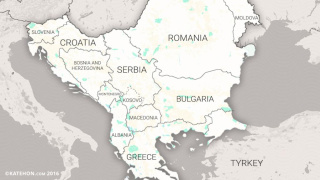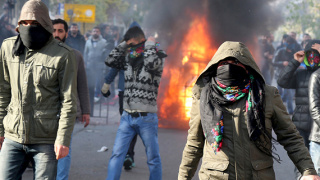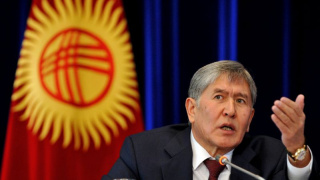THE “INDEPENDENT KURDISTAN REFERENDUM” IS UNLAWFUL
“We have come to meet here at a time of very pressing imminent events. These are very critical major events that are about to take place. Today, Turkiye finds itself facing the United States in various battlefronts.Since July 24, 2015, Turkiye has been engaged in a major struggle against the subversive organization the U.S. calls its land force.
U.S. President Obama has openly and clearly spoken about PKK/PYD/YPG as“our land forces.”Likewise, U.S. President Trump has also said,“we give weapons to YPG and PYD.” Tractor- trailer loads of weapons have been delivered to PKK/YPG/PYD.
Current wars are referred to as proxy wars. They are carried out by agents of the U.S. and Israel as their proxy: terrorist organizations such as PKK, YPG, PYD, AND ISIS. Syria is fighting against them, Turkiye is fighting against them, Iraq is fighting against them, Iran is fighting against them. As the countries and nations of Western Asia, we are engaged in a common battle. And we have reached a critical point in this war.”
Great Kurdistan is a project of Israel
As you know, Barzani has proclaimed that they are going to conduct a referendum for "Kurdistan's independence" on September 25. They call it Kurdistan, but we do not think that using the name of Kurds is befitting because, for all of us, Kurds are our brothers and sisters. A country to be set up with U.S. weapons, with Israeli weapons would not be a Kurdish one.Kurdistan or Great Kurdistan is an Israeli project.
I estimate the distance between Israel and Iran to be 1500-2000 kilometers. Once Barzani has set up Kurdistan, Israel will supposedly pass over this 1500-kilometer distance and end up right under our nose.
This is not only a threat to Turkiye's, Iraq's, Iran's, and Syria's territorial integrity, but it is at the same time a direct and immediate threat to our regimes.
As you will remember, the United States had a project called the Greater Middle East Project, in which it stated, “We will change the borders and regimes of 24 Muslim countries."The United States attacked Iraq in 1990 -- a country in our regional family of countries-- in order for that project to materialize, killing millions of our neighboring people and subjecting millions of women and girls to rape. Likewise, because of this project, the United States and Israel have been engaging in provocations for the past 6 years already, inducing internecine mayhem in Syria, causing a civil war and devastation.
We, the Western Asian countries, Iran, Turkiye, Iraq, Syria are determined to live here with our dignity, sovereignty, and independence. And we, the Western Asian countries, want the whole world to know that no one will be able to touch the integrity of our homelands. We will not allow our countries to be partitioned. We are determined to live here as brothers and sisters in peace and tranquility. We want the United States to end its meddling here, to gather all its soldiers and belongings and leave. We do not and will not accept its agenda.
We will stand with Iran, Iraq, Syria, Lebanon, Qatar, and will also foil the United States' plans to set up a Sunni NATO, a NATO of the Sunni denomination, in our region.
2- Evaluation of the referendum from a legal aspect:
A "referendum" in violation of the Iraqi Constitution and international law
(Attorney Onur Sinan Güzaltan of Vatan Partisi International Relations Bureau)
A referendum in violation of the Iraqi Constitution
The new Iraqi Constitution was adopted after the occupation by the United States, as a result of a referendum held in 2005, in which 66 percent of Iraq's population participated.
Article 13 of the Iraqi Constitution, which was jointly approved by the Iraqi people has a provision that reads “This Constitution is the highest law in Iraq and is valid in all regions of Iraq without exception,” stating in effect that the Constitution is binding in the entire territory of Iraq.
In the second clause of the same article there is a reference to the Austrian Jurist Hans Kelsen's globally accepted concept "Hierarchy of Rules," namely that “No law can be passed that is not in accordance with the Constitution. Provisions in regional constitutions or other legal documents that contradict the Iraqi Constitution are considered null and void."
The Iraqi Constitution, which repeats Kelsen of Austria, clearly states that (...) no law that violates the provisions of the constitution can be enacted or a decision rendered in any region of Iraq. The Kurdish Regional Government (KRG) of Iraq, which is under the leadership of Barzani too, as the name implies, is a region under the control of the Iraqi central government.
Article 141 of the Iraqi Constitution includes the following provision that clearly uses the name of the Kurdistan region: “Laws passed since 1992 in the Kurdistan region continue to be in effect. Decisions rendered by the Kurdistan regional government, including court decisions and agreements, are deemed valid (...) as long as they are not amended, voided or revoked pursuant to the laws of the Kurdistan region and the pertinent authorities of the region and as long as they do not contradict this constitution (the Iraqi Constitution).
Article 141 clearly states that KRG of Iraq can only pass laws and render decisions that are in accordance with the Iraqi Constitution. KRG of Iraq owes its existence to the Iraqi Constitution, and Barzani must act within the limits of his power (…)
Therefore, the subject "independence referendum" is a flagrant violation of Iraq's laws.
The referendum decision is in violation of international law
The conditions of compliance with international law pertaining to independence referendums were frequently debated on the occasions of the Kosova (2010), South Sudan (2011), and Crimea (2014) referendums.
It is useful to repeat the basic principle concerning independence referendums in light of these three examples, namely the principle expressed by the International Court of Justice, the authority in charge of making decisions under international law:
International law does not recognize any right to secession or setting up an independent state via a referendum or another means, with the exception of decolonization and termination of occupation.
If secession is occurring as a result of a military intervention by a third country, international law designates it as unlawful and prohibits other countries from recognizing the supposedly independent state resulting from this unlawful referendum.
If we apply the subject international law principle to the referendum decision of KRG of Iraq:
First, we must mention that KRG of Iraq is not a colony of the Central Government of Iraq.
Many individuals of Kurdish origin, first and foremost Presidents are Fuad Masum and Celal Talabani, have high-level positions in the Iraqi government. To claim that a central government, the leaders of which are Kurdish, is governing a regional government likewise governed by Kurdish people as a colony would be to talk nonsense, to say the least.
Second, KRG of Iraq is by no means under the military occupation of the Central Government of Iraq. In the region mentioned, the peshmerga forces under Barzani are continuing to function as law enforcement forces. In fact, they are even exceeding their power and carrying out operations in neighboring countries.
It is clear that, in light of the conditions put forth by the International Court of Justice, there is no legitimate basis for the referendum that KRG of Iraq wants to hold.
Based on the decision of the International Court of Justice, we can state that the referendum planned by KRG of Iraq is intended to be held as a result of intervention by a third country, that is by the United States, and that likewise in view of the rules of international law, if the subject referendum were to be held, other countries are prohibited from recognizing the supposedly independent Kurdistan.










